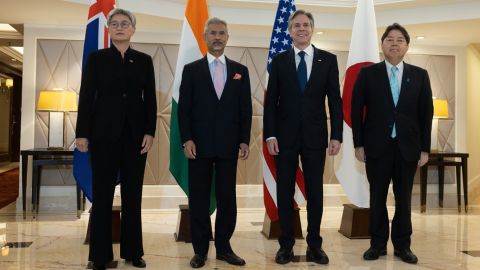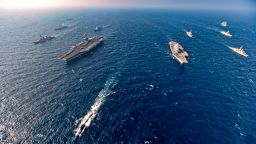Moscow’s invasion of Ukraine, and the support flooding in to Kyiv from countries across the world, sends a powerful message to “would be aggressors everywhere,” US Secretary of State Antony Blinken said Friday during a panel discussion in New Delhi.
“Part of the reason countries way beyond Europe are also so focused on this and are working to support Ukraine and deal with the challenge is because they know it could have effect here,” Blinken said, speaking at the Raisina Dialogue, an annual geopolitics conference.
“If we allow, with impunity, Russia to do what it’s doing in Ukraine, then that’s a message to would-be aggressors everywhere that they may be able to get away with it too,” he added.
The comments came as Blinken met with his counterparts from India, Japan and Australia – a grouping known as the “Quad,” or Quadrilateral Security Dialogue.
The Quad is an informal group focused on security that dates back to the early 2000s, though it has become more active in recent years as part of efforts to counter China’s reach and territorial claims in the Indo-Pacific.

The foreign ministers of the United States, India, Japan and Australia meeting on the sidelines of the G20 summit on March 3, 2023 in New Delhi.Secretary Antony Blinken
Blinken added that the challenges faced by people around the world cannot be dealt with by “any one country acting alone.”
“The great power of the Quad is you have four like-minded countries, united in their basic values, united in their basic interests, bringing different strengths, experiences, different comparative ways to tackle these problems,” he said.
Though he didn’t specify any “would-be aggressors,” he made several veiled references, saying the Quad is working on increasing countries’ maritime domain awareness – meaning greater surveillance on things happening in their waters – and tamping down on illegal fishing.
Top US officials have previously called out China for illegal fishing operations that “plunder the region’s provisions,” and accused Beijing’s “maritime militias” of intimidating and harassing Indo-Pacific countries.

China is alarmed by the Quad. But its threats are driving the group closer together
China has established the world’s largest naval force, built heavily-fortified islands in the South China Sea, and maintains a large presence of coast guard and fishing vessels in the disputed waters – frequently stoking tensions with its neighbors, and prompting promises from the US to stand by its partners in the region.
The Quad ministers reiterated the point in a joint statement on Friday, expressing “serious concern at the militarization of disputed features, the dangerous use of coast guard vessels and maritime militia, and efforts to disrupt other countries’ offshore resource exploitation activities.”
Though sometimes dubbed by critics as an “Asian NATO,” the Quad is not a formal military alliance – rather, it’s an informal strategic forum, featuring semi-regular summits, information exchanges and military drills.
It does not have the same kind of military agreements seen in NATO, like the concept of collective defense, where an attack on one member is viewed as an attack on all.
Quad members cooperate across various fields including Covid-19 and natural disasters, climate change and sustainability.

China has built the world’s largest navy. Now what’s Beijing going to do with it?
But security and the goal of a “free and open Indo-Pacific” are key focuses – and the Quad has increasingly been seen as a counterweight to China’s influence, with all four nations experiencing turbulent relations with Beijing in recent years.
The strategic location of each of the Quad nations – at different corners of the Indo-Pacific and with China in between them – has rattled Beijing, which fears the potential for military encirclement. It has condemned the bloc as an anti-China “clique” that is emblematic of a “poisonous” Cold War mentality.
The joint statement on Friday also touched on other regional and international issues, such as the humanitarian crisis in Myanmar following the military’s bloody coup two years ago, North Korea’s nuclear threat and increasingly aggressive missile testing, and the war in Ukraine.
The four ministers condemned the war “and the immense human suffering it is causing, and concurred that the use or threat of use of nuclear weapons is inadmissible,” according to the statement.

